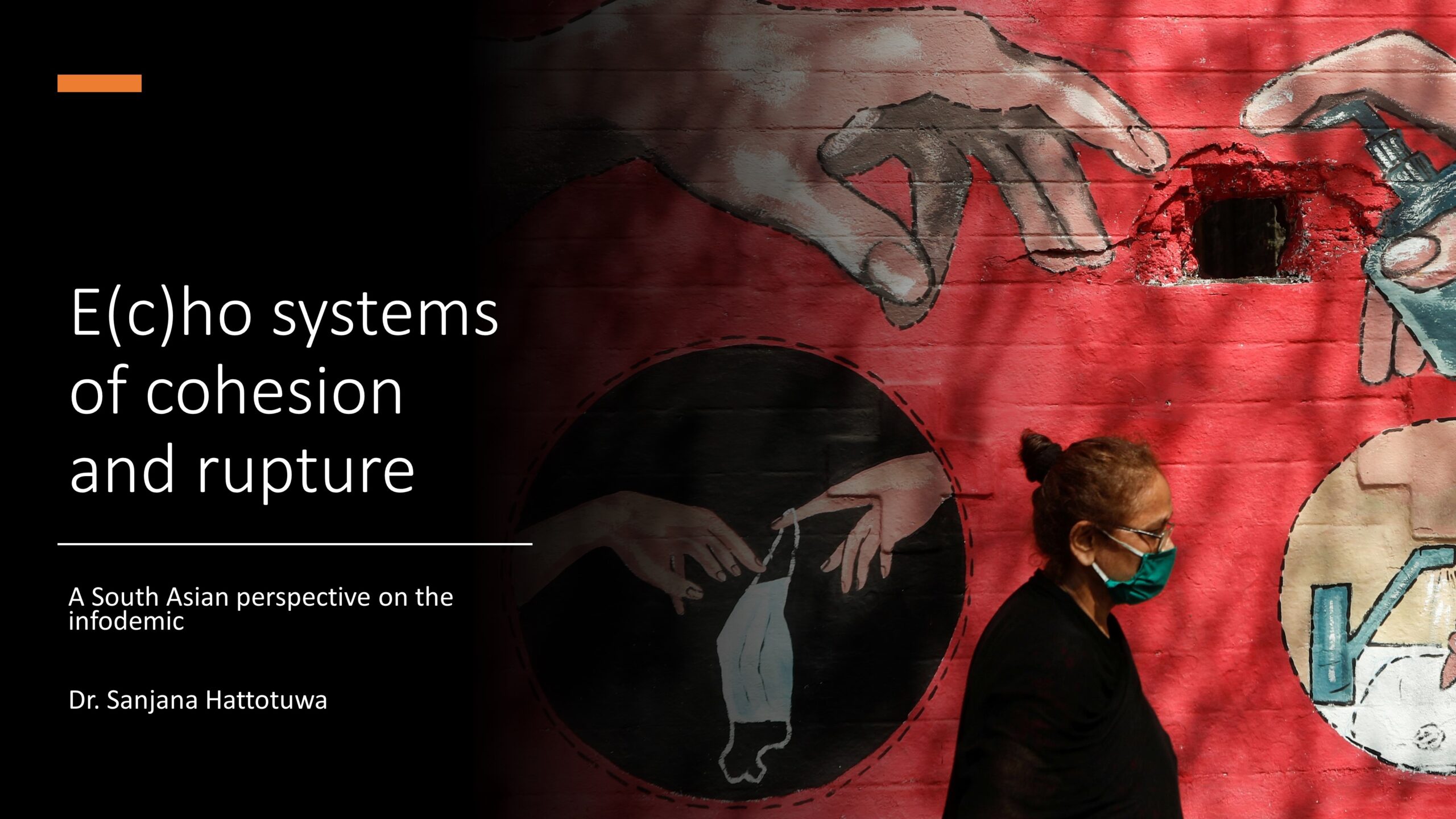ICT4Peace Special Advisor Dr. Sanjana Hattotuwa was invited to deliver a brown-bag session guest lecture by Prof. Karsten Donnay, Assistant Professor, Political Behavior and Digital Media at the University of Zurich and part of the DSI Community Democracy programme. The lecture, E(c)ho systems of cohesion and rupture: A South Asian perspective on the infodemic, was anchored to Sanjana’s doctoral research, at the University of Otago, looking at the complex, fluid, context-bound and symbiotic relationship between online content and offline unrest in Sri Lanka as well as New Zealand.
Download a PDF of the presentation here.
A video of the lecture is embedded below and can also be viewed on YouTube, in 4K resolution.
Stressing a Global South perspective as a necessary counter-balance to the Global North and Western media’s usual captures, perceptions and studies of social media, Sanjana stressed the importance of grounded study, locating content in specific countries, cultures, communities, and contexts. He then went on to explain why social media research, and the connections between online content and offline developments, are invariably and enduringly complicated. Noting the degree to which misinformation and disinformation are rife on leading social media platforms, including Facebook and Twitter studied for doctoral research, Sanjana explored why it isn’t an easy problem to fix.
He then explored why even in high-trust societies, like Switzerland or New Zealand, one still saw the emergence, entrenchment and expansion of information disorders linked to growing truth deficits. Building on Bruce Schneier’s concept of a ‘hackable society’, Sanjana added that disinformation, by design, also aimed to capture and retain attention, at an individual and societal level, in order to misguide, manipulate and misinform. He noted that high-trust societies have, counter-intuitively, very little to no safeguards against this.
Contesting the Western predilection to recommend deleting Facebook, he noted how this was a risible and ridiculous suggestion in the Global South, where just Meta/Facebook’s platform and product surfaces were inextricably entwined with every imaginable aspect of society, life, commerce, and politics. Sanjana flagged how doctoral research unpacked the simultaneous interplay of content, commentary and engagement that was prosocial as well as anti-social, on the same product, platform or app. He went on to explain how this contestation had offline consequences, especially in divided societies with a significant and growing democratic deficit.
Speaking to doctoral research in Sri Lanka, and subsequently discovered in New Zealand as well, Sanjana flagged how at certain moments, the production of content on social media resulted in angry and anxious users who in their millions, contributed to a volatile community, that in turn could be instrumentalised through sensationalist, emotive, mis- or disinformation to react or respond in certain ways. These dark patterns of attention-hacking and social manipulation through emotional contagions online, discovered in Sri Lanka at moments of significant offline unrest, were templates for the weaponisation of social media, especially in media cultures that reflexive shared content.
Speaking to a point made by Nobel Peace Laureate Maria Ressa, Sanjana noted that Sri Lanka and the Global South were testbeds for what at greater scope, speed and scale were unleased in Global North markets, on both sides of the Atlantic, and beyond, including now in New Zealand.
Speaking to information disorders more broadly, Sanjana then focussed on Russia’s insidious disinformation efforts globally after the invasion of Ukraine, and how it undermine the very basis of fact-checking. This, he noted, was also a grand design of disinformation entrepreneurs, including nation-states, in order to create and maintain significant volatility in democratic societies. Quoting Hannah Arendt, he noted how in Sri Lanka, what was being deployed with greater sophisticated and scale by Russia today was present and studied a couple of years ago, where the very basis of truth and meaning is undermined, eroding the necessary definition separating fact and fiction.
Speaking to the Dutch psychologist Nico Frijda’s ‘law of apparent realities’, where “emotions are elicited by events that individuals regard as real, and the intensity of their
emotions corresponds to the degree to which they experience the events as real” – referenced in his doctoral thesis – Sanjana went on to explain how the algorithmic amplification of psychotic disorders contributed to a degree of mass psychosis, present on and guided by social media, that was unprecedented and consequently, anti-democratic and disturbing. Speaking to how meaning and belonging were created in mis- and disinformation communities on the lines of cults, Sanjana used murmuration as a metaphor to explain how, online, communities embraced fringe beliefs and amplified them.
Sanjana ended by looking at disinformation’s (near) future, embracing decentralised finance, distributed and decentralised cloud architectures, encrypted communications, and, counter-intuitively, the democratisation of access and use, leading to greater information disorders, defined through new ecologies and economies of toxic productions. All this would undermine social cohesion, at pace.
Using a Prince Rupert drop as a metaphor, Sanjana talked about how (social) media regulation could be more fit-for-purpose driven to deal with the challenges in social media landscapes today, and what’s to come in near future. He introduced the term ‘virtuous viscosity’ as a way to build friction around the rapid reach of harms, while at the same time ensuring that content regulation migration beyond simplistic deplatforming as a means to curtail, control or constrain the seed and spread of toxic content. He also spoke of an ecological, grounded approach, interrogating the nurture and nature of harms.
A vibrant discussion followed Sanjana’s lecture, looking at contemporary Russian disinformation, the degree to which media and political cultures in a country are able to stymie the growth of online harms, the nature of social media regulation, and the degree to which high-trust societies are susceptible to information disorders.

